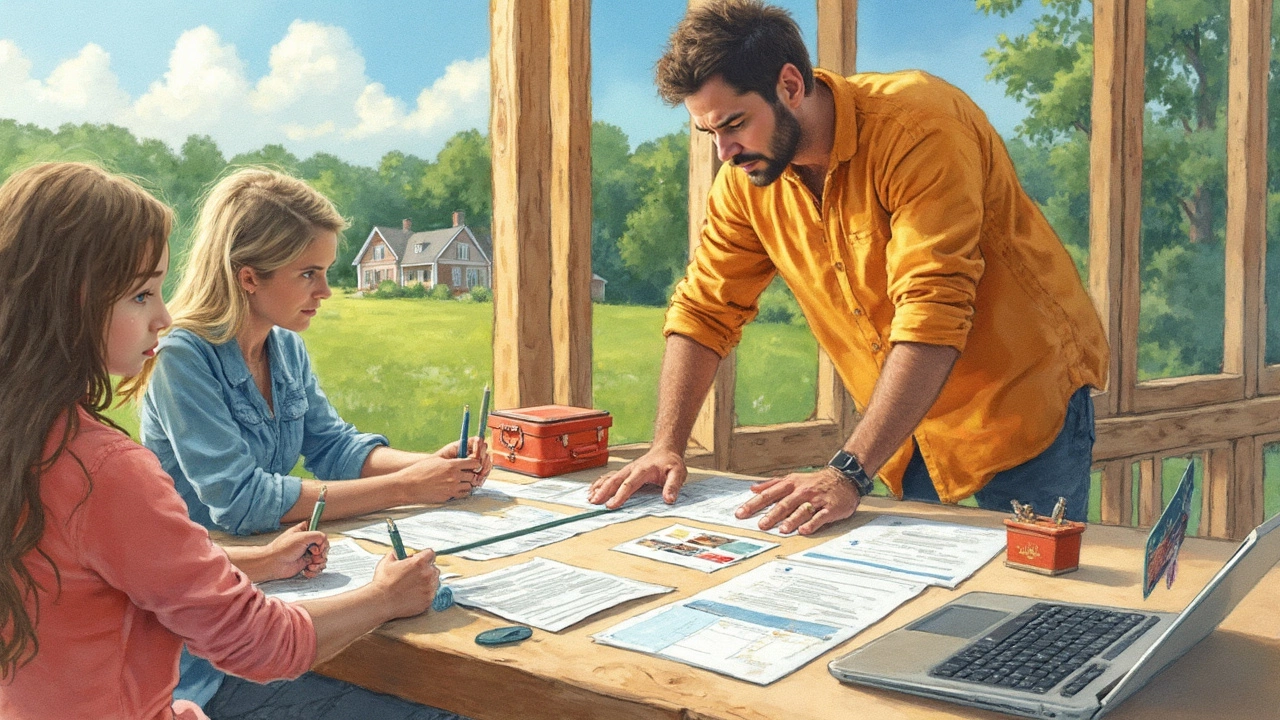Can I Legally Build My Own House in Virginia? A Straightforward Guide

Jun, 17 2025
If you’re picturing yourself hammer in hand, building your dream place on that patch of Virginia land you just spotted, you’re probably wondering: is this even allowed? The short answer—yeah, you can build your own house in Virginia. But there’s some real red tape and a whole checklist you can’t ignore if you want the keys in your hand and the law off your back.
First thing to know, Virginia doesn’t ban average folks from being their own home builders. In fact, there’s a specific “owner builder” path in state law that lets you steer the project on your own private property. The catch? You need to follow the exact same building codes as the pros. No cutting corners just because it’s your lot and your hammer.
You’re going to need the right permits right from the start—and that means not just your own say-so, but signatures from the county or city inspectors. There’s also zoning rules that decide what you can build and where. Ignore one little rule, and you might be ripping things down, not moving in.
- Legal Basics: Can You Actually Do It?
- Permits and Paperwork in Virginia
- County Differences and Land Zoning
- DIY or Hire Pros: Rules and Risks
- Money-Saving Tips and Common Pitfalls
Legal Basics: Can You Actually Do It?
Let’s get clear: Virginia law says, yes, you can build your own house if you own the land. It doesn’t matter if you’re not a licensed contractor, thanks to what the state calls “owner-builder” rules. These rules are backed up by the Virginia Uniform Statewide Building Code (VUSBC), the same code pros follow for things like new construction and renovations. That means your house still has to meet the exact same safety and quality standards—it just doesn’t have to be built by someone with a contractor’s license.
The law covers both stick-built homes (the ones you build from scratch on-site) and modular homes (factory-built parts, assembled on your land). The only catch: you can’t build a home with plans to flip it, rent it out right away, or act like a business. The house has to be for you—your family, your residence, your name on the mailbox. Virginia says this is about personal use, not starting your own construction company.
Here’s how Virginia’s owner-builder law stacks up against common questions:
- Do you need to own the land? Yes, you absolutely do.
- Do you need a contractor’s license? Not for your own residence—but you must hire licensed pros for any electrical, plumbing, or HVAC work.
- Can you build it for someone else? Nope. The law doesn’t cover you building for friends, neighbors, or to sell.
- Do you have to follow zoning and building codes? 100% yes, in every county.
Check out the typical requirements around Virginia:
| Requirement | Owner-Builder | Licensed Contractor |
|---|---|---|
| Own the land | Required | Not required |
| Construction for others? | No | Yes |
| Building Code Compliance | Required | Required |
| Permits | Required | Required |
| Can hire subs? | Yes (must be licensed) | Yes |
If you’ve read stories about folks building off-the-grid cabins or tiny homes without asking, don’t get inspired to skip the rules. Counties in Virginia regularly fine or even sue people who build without permits. Some have to tear the house down if it’s not fixed up. Not worth the risk if you actually want to live there. So, yes: you can build your own house in Virginia, but only if you play by these rules from the very start.
Permits and Paperwork in Virginia
Here’s where things can get sticky: Virginia is strict about permits when you want to build your own house in Virginia. The days of just starting up with some lumber are long gone—paperwork rules the game, and missing a step can freeze your build or cost you big time.
You’re going to need a building permit for almost everything. This starts before even breaking ground, and each county’s application is a bit different. Usually, you’ll have to submit a detailed site plan and construction drawings. The documents need to show where you’re putting the house, how it’ll be built, and how you’ll handle water, sewage, and utilities. The plans must stick to the statewide Virginia Uniform Statewide Building Code—there’s no winging it.
Here’s a snapshot of typical permits you’ll need:
- Building Permit - covers the main construction
- Electrical Permit - if you’re wiring the house
- Plumbing Permit - for any pipes or septic hookup
- Mechanical Permit - includes heating and air systems
- Land Disturbance/Grading Permit - if you’re digging, leveling, or doing driveway work
- Septic Permit - needed if you aren’t using city sewer, and these can take months to approve
- Well Permit - if you need your own water supply
Some counties make you attend an in-person meeting to explain your plans. Others just want a stack of paperwork and a fee (plan at least a few hundred dollars, sometimes over $1,000 depending on house size and the local office). They’ll inspect the project in stages—don’t skip a check, because a failed inspection means tearing out the mistakes and starting over.
| Permit Type | Estimated Fee Range |
|---|---|
| Building Permit | $500 - $2,500 |
| Electrical Permit | $60 - $200 |
| Plumbing Permit | $60 - $200 |
| Septic Permit | $300 - $1,000+ |
| Well Permit | $100 - $300 |
Each step on the permit checklist needs a green light from inspectors. If you switch up your building plan after getting permits, you have to get new approvals. And one last thing—if the house is in a historic district or flood plain, expect way more hoops and longer waits. Check with the local building office early so you’re not caught by surprise.

County Differences and Land Zoning
Building your own house in Virginia isn't a one-size-fits-all deal. Each county (and even cities or towns) have their own rules on where and what you can build. Some places are strict, others not so much. If you’re looking at build your own house Virginia tips, this is where things often trip people up.
First up, zoning matters a lot. Zoning rules say if land is for residential, agricultural, commercial, or some other use. If your dream lot is zoned for agriculture or conservation, you might not be allowed a house—or you’ll face serious hurdles. Check the county zoning map before you buy. Places like Fairfax County post their zoning maps online. Rural counties sometimes still use paper, so call their office if needed.
Want to build in Fairfax, Loudoun, or Prince William counties? Expect more paperwork, more fees, and tighter zoning compared to spots like Wise or Scott County out west. Some counties have “minimum square footage” rules or require special setbacks—meaning your house has to be a certain distance from property lines, roads, or streams. Miss those, and your plans might get pitched back by the zoning office.
- Always ask the local zoning office if your lot is a true “buildable lot.” Don’t trust a real estate ad alone.
- Make sure utilities like sewer or septic are possible. In places like Fauquier County, you’ll need an approved septic perc test before you can even get a building permit.
- Some historic districts limit even colors and materials you can use—it’s not just about where the house sits.
The bottom line: every county in Virginia has its own spin on the rules. A fast call or email to the zoning office can save you months of hassle. If you want to build something a little different—like a tiny house or container home—run it past zoning first. Don’t learn the hard way by skipping this step.
DIY or Hire Pros: Rules and Risks
Tackling the project yourself sounds tempting, but Virginia lays down some rules you can’t skip. The owner-builder route means you handle the permits, code inspections, and, yes, all the responsibility. Here’s the kicker: if you plan to sell the house within two years of building it, the state might treat you like a pro builder and demand additional licensing.
If you’ve got the skills and time, going DIY can cut serious costs—often anywhere from 10% to 25% off the final price by skipping the general contractor. But a big chunk of folks run into trouble once they hit wiring, plumbing, or inspections. Virginia code says you must use licensed plumbers and electricians for most work, even as an owner-builder. Most counties will ask for proof the work’s either passed inspection or was done by someone with a license number on file.
Take a look at some real-world differences in outcomes:
| Path | Average Build Time | Inspection Pass Rate on 1st Try | Cost Overruns* |
|---|---|---|---|
| DIY Owner-Builder | 12-20 months | 54% | Up to 30% |
| Hired General Contractor | 8-12 months | 82% | 10-18% |
*As a percent above the original budget, based on county permit office data from 2022-2024.
So what’s your move? If you don’t have experience reading blueprints, juggling subcontractors, or wrangling county inspectors, at least consider hiring a pro for key phases—like foundation, electrical, or roofing. You can still handle project management and some of the hands-on work, which lets you keep a tighter budget while passing the fussy parts over to folks who know how to get it done right the first time.
One last thing: don’t forget about insurance. Most banks won’t hand you a construction loan unless you’ve got a licensed contractor on the job—or you can show you understand the risks and have solid insurance coverage. Cutting corners here is a bad idea if something goes sideways.
If you decide to build your own house in Virginia, stay on top of these rules. It’s the difference between moving in with a smile and getting slammed by surprise problems down the road.

Money-Saving Tips and Common Pitfalls
Building your own place in Virginia isn’t cheap, but you can dodge a lot of extra bills and headaches if you play it smart. Lots of first-timers drop cash on stuff they never should’ve paid for, all because they didn’t know the rules or didn’t plan ahead. Let’s run through what really moves the needle on savings—and what can blow up your budget fast.
The biggest money pits? Permits and rework. Permits in Virginia aren’t free, but they’re nothing compared to paying for work twice. A permit for a single-family home averages $1,000, but if your unpermitted deck or wiring gets flagged, you could pay double or tear it out entirely. Always pull permits before a shovel hits dirt.
When it comes to contractors, you can cherry-pick jobs to DIY, but don’t fake being an expert. Virginia code makes you responsible for shoddy work if you skip hiring licensed pros for stuff like electric and HVAC. Bad inspections can slow everything down, and counties are strict. Skip a licensed electrician today, and you could pay thousands fixing unsafe wiring later.
Here are some money-wise steps for owner-builders in Virginia:
- Get quotes from at least three local suppliers before buying materials. Lumber prices bounce around—don’t grab the first deal you see.
- Shop at local auctions or reuse stores for non-structural stuff like doors, windows, and vanities.
- Do site cleanup, painting, and simple landscaping yourself. Labor costs add up fast, so save the pro budget for technical work.
- Keep all receipts and a detailed budget tracker. A lot of people lose track and end up with creeping costs that quietly balloon the total.
- Double-check your zoning and land setbacks before you even sketch your layout. Zoning mistakes kill projects early and big.
Here’s a quick table showing where most folks overspend versus where smart cuts pay off:
| Common Money Pit | Potential Cost | Smart Savings Move |
|---|---|---|
| Unpermitted Work | $5,000+ (fines, rework) | Get all required permits up front |
| Material Overbuying | $2,000+ wasted | Order only what your plan calls for; return leftovers |
| Hiring for Basic Labor | $10-$30/hour extra | DIY cleanup, painting, or hauling |
| Ignoring Building Codes | $3,000+ fix-up costs | Follow build your own house Virginia legal code to the letter |
One last thing: don’t let the excitement rush you. A rushed build gets you mistakes, not keys. A home inspection that fails sets you back months and eats up way too much cash. Take your time, get the facts, and ask your county building office every question you can think of—they’ve seen every mistake in the book.